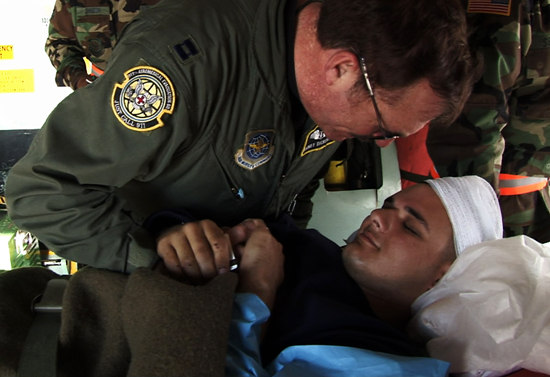Documentary film “˜Fighting for Life’ reveals the medical side of war

A still from the documentary, “Fighting for Life,” which profiles the Uniformed Services University and military medics working in the war in Iraq. The documentary will be screened tonight at the James Bridges Theater on campus.
By Elizabeth Packer
April 12, 2010 9:10 p.m.
The war in Iraq has inspired a number of movies and documentaries, covering everything from the search for weapons of mass destruction to the role of oil, varying in their degrees of political commentary and sensationalism.
In “Fighting for Life,” a documentary from Academy Award-winning director Terry Sanders, an often-overlooked segment of the war is presented ““ the military medics working in Iraq to save wounded soldiers.
The film will be shown tonight at 7:30 p.m. in the James Bridges Theater as part of the Documentary Salon in cooperation with Melnitz Movies, and will be followed by a question and answer session with Sanders, a UCLA alumnus.
In making the film, which follows the stories of students at Uniformed Services University, a school that trains military medics, as well as the work of doctors and nurses serving in Iraq and the wounded soldiers they treat, Sanders strove to create a documentary that rang authentic.
“It’s not sentimental or sensational … and the real challenge was to keep it apolitical, so that everyone can relate to it, because it’s about the wounded and the doctors and nurses and it’s not about the politics,” Sanders said.
The documentary was filmed entirely with small, high definition cameras, and Sanders used no movie lights, relying only on available light and using infrared at night, in order to enhance the film’s authenticity and emotional power.
“Everything you see is absolutely real, nothing is staged, nothing is done twice, it’s all action as it is happening,” Sanders said.
The impetus for making the film came after Sanders was contacted by a woman, Tammy Alvarez, whose son attended the university. She reached out to Sanders when the school was threatened with closure because of congressional budget cuts back in 2004, thinking a film could bring attention to and publicize the school’s plight. Initially reluctant, Sanders visited the school and was impressed by the dedication of both the students and faculty.
“After visiting, I definitely had this sense that the school should not be closed, that it was extremely valuable and important and functioning very well, so I agreed to do the film,” Sanders said.
Alvarez went on to do the majority of the film’s fundraising and served as executive producer.
Sanders and his crew, including UCLA alumna Jennifer Gloss who served as co-producer, spent two years filming, traveling from Iraq to military hospitals in Germany and the U.S. He ended up with 130 hours of footage, and the film went through many iterations before it was edited down to its final 89-minute running time.
As U.S. involvement in Iraq escalated, Sanders found he had to readjust the story he was telling and the structure of the documentary.
“The war kept getting bigger into 2005, so I found myself making a film not so much about the school but about where these young people went, and the wounded of the war,” Sanders said. “It became this epic on military medicine, so the film expanded in a way I hadn’t anticipated in the beginning.”
Marina Goldovskaya, a professor in the School of Theater, Film and Television and founder of the Documentary Salon 14 years ago, saw the final product and wanted it to be shown at Melnitz as part of the documentary series.
“The movie is very well done. There are no sentimental sequences. It is sometimes hard to watch, but it is important to watch, because we know only one side of the war in Iraq,” Goldovskaya said. “(“˜Fighting for Life’) is very much in line with the values of the Documentary Salon.”
Andrew Hall, the director of Melnitz Movies, said he was pleased with Goldovskaya’s suggestion. He anticipates an interesting discussion with Sanders following the film and feels “Fighting for Life” will appeal to both film students and the general public.
“Among film students, I imagine there will be interest in learning how (Sanders) became so successful,” Hall said. “And for other students, the film covers a topic of interest, it is a very compelling story.”
“Fighting for Life” accomplished its original goal of bringing attention to the university and preventing the school’s closure, and the film even had a special screening for members of Congress, Sanders said. It has also been positively received in the military community.
“The military medical people love it, because we’re seldom shown the work that they do, and they are the actual fighters for life,” Sanders said.


